
Iranian religious scholar Naser Naghavian voiced his criticism of the Iranian regime in an interview that was posted on AkhbareFori on YouTube on November 18, 2021. He said that Iran's Supreme Leader Ayatollah Ali Khamenei must be held responsible for his actions and for the statements made on his behalf. He went on to say that he considers himself part of the regime, and does not oppose the Rule of the Jurisprudent, but that he does oppose the rule of an oppressive individual as well as injustice and dictatorship. Naghavian said that he is embarrassed by President Raisi and that the position of president is beyond his capabilities. He added that the Guardian Council, which was responsible for "imposing" him on Iran should be prosecuted for this.
Naghavian then said that it is childish to say that the fact that ISIS has not attacked Iran is an indication that Iran is secure: "after all, there are several ISIS-like phenomena attacking us from within." He said that people like himself are growing in number, and such ideas are "creating commotion and if some day this commotion finds power, the things that we and the esteemed gentlemen do not want to happen might happen. This is what the history of rebellions, reforms and revolutions shows us."
Naser Naghavian: "To cut it short, I am critical of two things. The first is the presence of clerics in executive positions. Our experience in the past 42 years teaches us that this harms religion, which these clerics pretend to represent, as well as the clerics themselves.
[...]
"Ever since the clerics took charge, with the exception of specific cases, they have been incompetent and unsuccessful.
[...]
"The reason is very clear. This is not the job of the clerics. They have no expertise in medicine, engineering, agriculture, running a state, and so on.
[...]
"The second thing is that they must accept criticism. Our senior officials should own up to their mistakes and be held accountable.
[...]
"All the slogans like 'War until victory,' 'The road to Jerusalem passes through Karbala,' 'There can be no peace with Saddam,' were coined by Imam [Khomeini]. However, we reached a point where he had to give up on these slogans. [He realized] that 'War until victory' is not the right slogan, and that we did not win the war and had to stop it. He said himself: 'I had to drink from the poisoned chalice.' If these people really follow the path of the Imam, as they claim, they should accept this. So I am critical on these two issues and I express my criticism in a clear, honest way. Having said that, I can be defined as part of the regime. I accept the principles of the Revolution and the regime. I accept these principles on the condition that they are implemented. The Assembly of Experts must do its job properly. The Leader [Khamenei] must be held accountable for all his actions, and what is reported to the public on his behalf must make sense and conform with logic and justice. The same is true for all the organs of the regime.



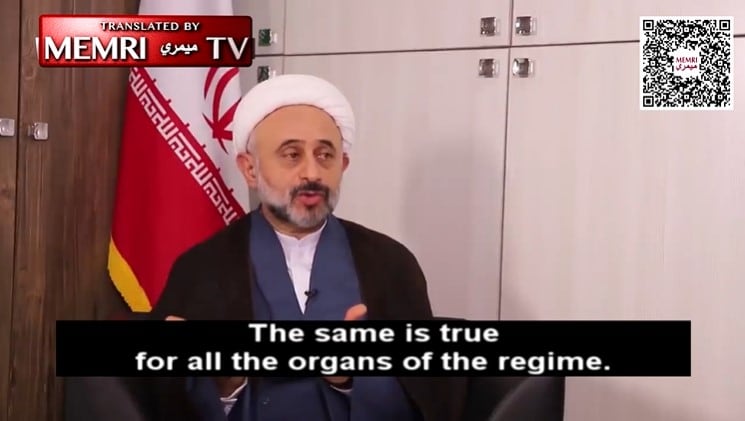
[...]
"I have become like a son whose father says to him: 'I give you money and I provide you with security.' This is not how it should be. [The state] must provide many other things. Security encompasses many things: Job security, professional security, economic security, mental security, sexual security, security in the news. There are many types of security. Some people claim that the mere fact the ISIS has not attacked our country is an indication that we have security. This is a very childish perspective. After all, there are several ISIS-like phenomena attacking us from within. You buy something today without knowing what it will cost tomorrow. You gather all your money to buy some shack, and then they tell you the price went up. Ultimately, you will have to go to the graveyard to be able to afford a place. If the estimated gentlemen [of the regime] act in fairness, they will notice that people like me are growing in number. There used to be a time when I was the only voice. Now there are many similar voices. In addition to the taxis and buses, private gatherings, and discussions at the metro, the esteemed gentlemen can attend smaller circles of university lecturers, clerics, and other distinguished people, and even hear the complaints made by some sources of religious authority. Then, they will realize that this is not one lonely voice. It is creating commotion and if some day this commotion finds any power, the things that we and the esteemed gentlemen do not want to happen might happen. This is what the history of rebellions, reforms, and revolutions shows us. I fear that day.
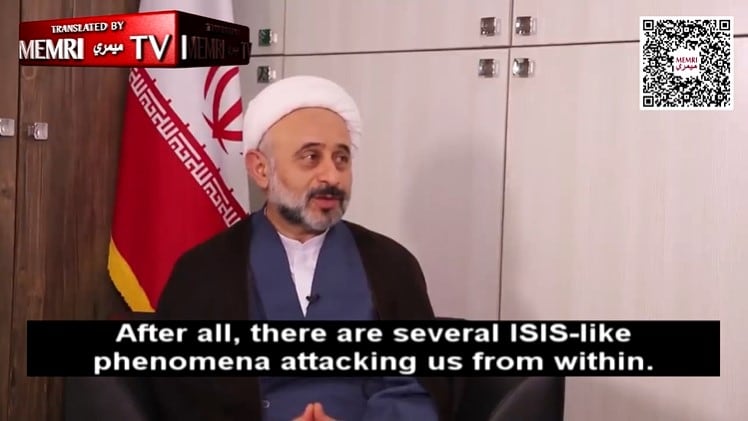
[...]
"When Mr. Rouhani came to power, he started with nice words and good manners. I made a speech in which I commended his rhetoric. Only after he faced pressure and was cursed... After all, there is a limit to what he could take. Ultimately, he had to tell them to go to Hell. I did not support this comment by him. I wish he would have shown tolerance in this case as well, and had not said this. But you cannot even begin to compare his rhetoric to that of Mr. [Raisi]. Everybody in the world is talking about this. Look up '[Raisi's] gaffs' on the Internet, and see what you get. Even when you are all by yourself, you feel embarrassed by the way he builds sentences, and you get the impression that the position [of president] is way over his head. I said elsewhere that if we want to place people on trial, we should begin with the people who impose such individuals upon us.
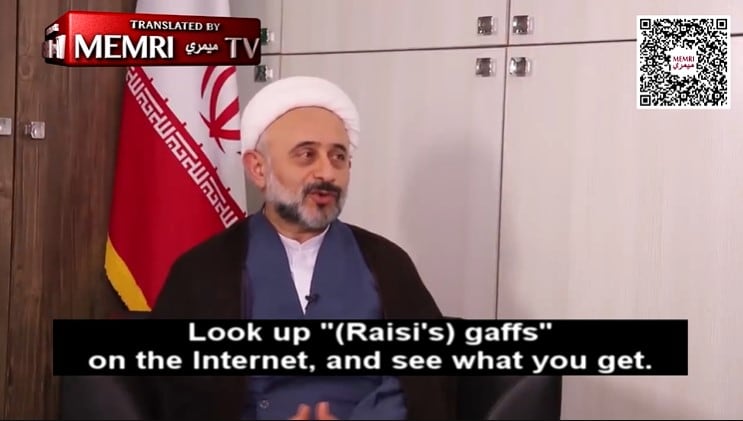
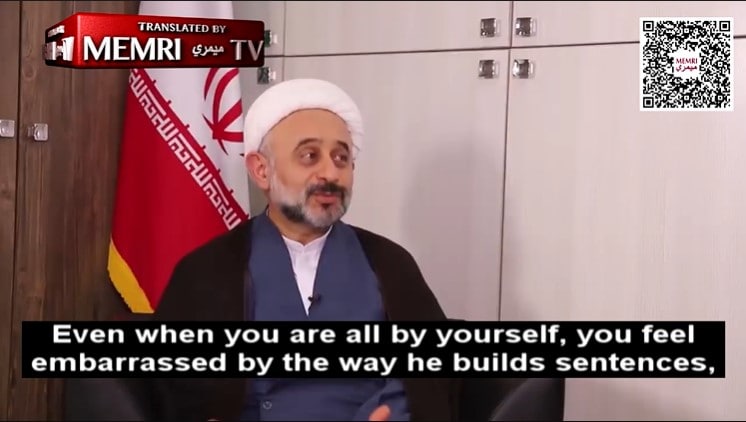
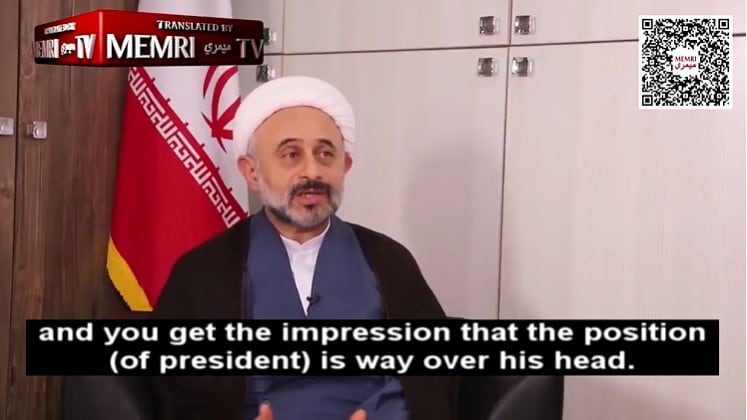
[...]
"We should begin with the people who affirmed his candidacy and imposed him upon the public. If they did not know [the truth about Raisi], then they are very naïve. So why are they in a position of power?
Interviewer: "You mean the Guardian Council..."
Naghavian: "Of course. The Guardian Council. Yes.
[...]
"I am a student of religion. When I walk down the street, I want to be able to hold my head high, because of the decisions made by this regime. Right now, my head is down. You did something that is indefensible.
[...]
"When I was abroad, I shook hands with women, when I had to. I have no problem with this, because my jurisprudence allows it.
[...]
"Who says I oppose the Rule of the Jurisprudent? I oppose the rule of an oppressive individual. I oppose a rule of injustice, a rule of dictatorial tyranny."















